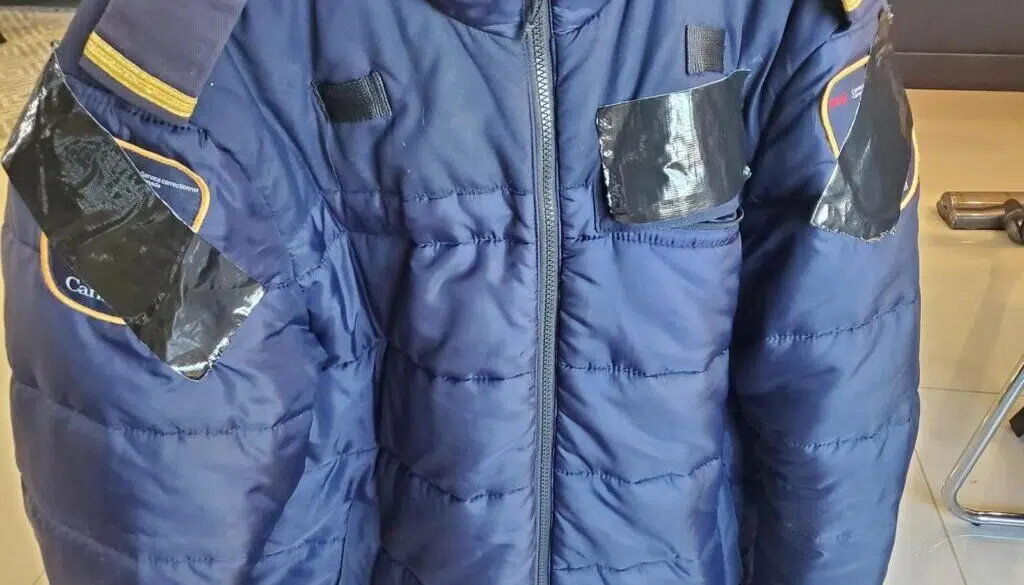
(Image: Contributed)
More than two dozen federal correctional officers in Atlantic Canada are being reprimanded by their employer for staging a silent protest over a “toxic workplace,” according to the Union of Canadian Correctional Officers (UCCO).
Officers across Canada have started covering their badges with tape while working inside the prisons to send a message of discontent to their employer, Correctional Service Canada (CSC).
UCCO regional president Rene Howe said it didn’t become an issue until the officers wore the tape in public while escorting prisoners for medical appointments and other duties.
The 26 reprimands affect officers across Atlantic Canada’s five federal prisons.
“It’s a sign of disrespect for the uniform because we’re not feeling respected as employees from our employer,” said Howe. “This is a very peaceful demonstration. It was a way of waking up CSC and saying we’re tired of being bullied. We’re tired of this toxic work environment.”
“There’s no walkout, no wildcat strikes. We still continue to work as correctional officers.”
Howe told Huddle the letters of reprimand were handed out on March 9 but officers with the taped badges were sent home from work sometime last week without pay. Depending on the length of their shift, that could be 16 hours of lost income.
How said the letters of reprimand haven’t come with any punishments yet. But officers will possibly lose more income from unpaid suspensions.
“A significant number were sent home without pay, so they’ve already been reprimanded, now they’re getting another letter,” Howe said. “It goes to show the lack of respect that they truly have for us.”
The union claims that young correctional officers often face verbal harassment and intimidation from older members of upper management. Howe says filing grievances, even when the arbitrator sides with the union, does little to change the behaviour.
“We have incidents where senior management will walk into an office, yell, scream, swear, and intimidate some of our younger staff,” he said “And there doesn’t seem to be any repercussions for that.”
Howe said the union doesn’t know how CSC deals with a problematic member of management after the grievance process.
“We’ve won some of those grievances through adjudication…but we’re not privy to what happens afterwards.”
The taped badges protest isn’t unique to Atlantic Canada but Howe hasn’t heard confirmation if other jurisdictions are reprimanding correctional officers.
“Atlantic Canada (is the most heavy-handed) of all the regions put together,” he claimed.
Huddle reached out to CSC for comment but didn’t receive a reply by our publication deadline.
The union says reports have already been compiled on the workplace culture in a few of the prisons in Atlantic Canada. Those reports are confidential, however, and Howe claims CSC has done little to implement the reports’ recommendations.
Howe says being a correctional officer has stress and danger attached to the job. The employees should face additional anxiety brought on by bullying.
“There’s inherent risk when you take a job as a correctional officer; we accept that going into this field,” he said. What we don’t accept is the lack of respect from management.”
Regardless of the outcome of the 26 reprimands, UCCO will be filing grievances against Correctional Service Canada.
But bullying isn’t the only problem the union is ringing alarm bells over. Howe says in the 27 years he has been involved in the prison system he has never seen such high levels of drug abuse.
While contraband has been around as long as prisons have, the types of drugs being used today make things dangerous for officers.
“Now we’re dealing with fentanyl, with high powerful drugs,” he said. “While they’re stoned, they’re very aggressive towards the officers.”
Drone technology, of all things, is the reason why drugs are so easily smuggled into prisons in modern times. Drones can fly over the facility and make a drop-off to a waiting inmate.
Howe says detection devices do exist, and could solve the problem of drone drops, but claims CSC has invested very little into the technology
“CSC has put a small box within the institution; however, it is not manned–there’s no training on it. The box that they have isn’t sufficient enough to detect all the drones coming in.”
On top of all these disputes, the collective bargaining agreement for correctional officers expires in June. The two sides will be resuming talks soon on a new deal.
Derek Montague is a reporter for Huddle, an Acadia Broadcasting content partner.






